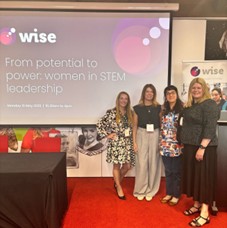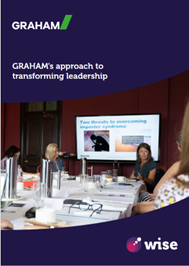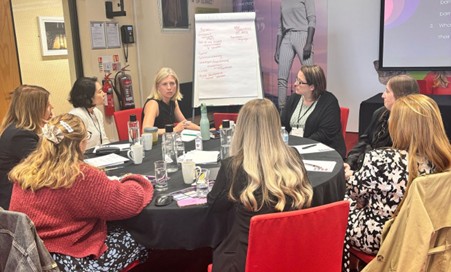From potential to power: women in STEM leadership – what did we learn?
On 19 May we held a WISE knowledge sharing event for our members focusing on the topic of women in leadership.
We welcomed five fantastic speakers to share their experiences and the support they received personally to help them thrive, as well as what their current organisations are doing to break down leadership barriers for women.

What did we learn?
The importance of achieving leadership parity
WISE Training and Delivery Manager, IET
Women make up nearly half of the working population and by not having equal representation within leadership roles we’re underutilising human potential and missing out on different leadership styles. Innovation without inclusion is incomplete and results in products and services that do not serve and support everyone.
There is a genuine business case for equity in leadership. Companies with more than 30% of female executives are more likely to outperform organisations without. Not only is it the right thing to do but it also makes strategic and financial sense.
Leading effectively whilst working flexibly
Marina Dawes, Director of Science, AWE
Marina joined AWE on their graduate scheme over 20 years ago, now she is the Director of Science. Throughout her career progression she has primarily worked part-time to balance raising her children alongside her career.
Marina’s journey highlights the powerful impact of allyship, particularly through the support of her managers—most of whom were men—who, despite working in more traditional, full-time roles, recognised her potential and championed the flexible arrangements she needed to thrive.
Her experience shows how flexible working not only empowers individuals but also strengthens the wider business by fostering inclusion, trust, and personal growth. It is not just for women, or parents, it enables all colleagues to take ownership of their work-life balance to be their best selves.
Combating isolation in leadership
Susie Dixon, UK Delivery Director, Capgemini
Isolation in leadership is a common experience, and not just for women. Susie’s presentation taught us that iis multifaceted, and connections can be made through shared interests—whether it’s a love of pets, hobbies, or the same TV show. Finding common ground helps break down barriers and build stronger, more inclusive teams.
When Susie stepped into her first leadership role, she faced the challenge of leading an all-male team who were significantly . She knew she had to earn their trust and credibility, so she made the conscious effort to lead with empathy and advocacy. Rather than asserting authority, she observed what her team truly needed and focused on supporting them in ways that mattered to them—not based on assumptions, but on genuine understanding. By making it about them, not her, Susie demonstrated that effective leadership is rooted in care, connection, and the courage to lead with empathy.
Susie shared the importance of leading by example and being what you want to see in other people.
IGNITE women in leadership
Hollie Cregan, Head of Equality, Diversity and FIR, GRAHAM
Hollie presented the impact of GRAHAM launching a women-specific leadership development programme to develop existing talent within the organisation.
As part of this event, we have worked with GRAHAM to create a resource on their women’s development programme IGNITE. You can read more about the programme in the case study.
As well as demonstrating the impact of learning and development, Hollie shared insights from her own journey into leadership. Highlighting the importance of asking for opportunities and not being scared to say yes. A key takeaway is that being brave is an essential skill.

Emotional intelligence: the biggest enabler for women in leadership?
Claire Thompson, Head of Learning and Development, Balfour Beatty UK
Claire shared how Balfour Beatty embed leadership skills, ensuring it’s nurtured at every level. They build resilience and emotional intelligence right from apprentices to senior leaders, to equip all employees with the necessary skills for success.
75% of senior careers that stall, or derail, are due to deficiencies in emotional-intelligence related skills.
We learnt how developing emotional intelligence starts with self-regard and recognising your own strengths and how to use them effectively. This evolves into self-awareness and self-management – skills that help individuals navigate challenges, support others, and create inclusive environments where everyone can thrive.
Emotional intelligence is a lifelong journey. It helps us understand our triggers, what pushes us out of our comfort zone, and how to build the resilience needed to lead with empathy and authenticity. Whether you are leading a team or contributing as part of one, these skills are essential—not just for performance, but for creating a culture where people feel seen, supported, and empowered.

Attendees took part in table discussions and shared practical ways to implement change and tackle barriers to untap the potential of women leaders as well as what skills make a good and effective leader.
Thank you to our speakers, attendees and IET Birmingham: Austin Court for hosting the event.
Our next in-person event, Combatting sexual harassment in the workplace is on Wednesday 2 July 2025, 11am-4pm and will be hosted at IET Stevenage: Futures Place.
